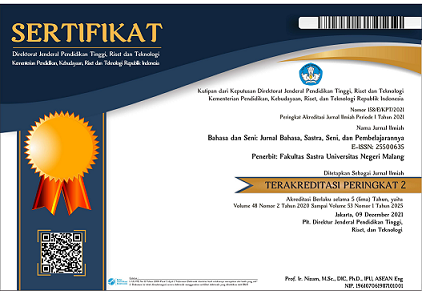ASMAUL HUSNA: LINGUISTIC FORMS, THEOLOGICAL MEANINGS, PEDAGOGICAL IMPLICATIONS, AND THEIR EQUIVALENTS IN INDONESIAN TRANSLATION
Abstract
Viewed from their linguistic forms, Asmaul Husna are classified into the mubalaghah group whose meanings require the addition of “Maha” (the All-/Omni- /the Most) and the non-mubalaghah group, without the word “Maha”. Out of 99, only 69 names come up in the Qur’an with different frequencies, ranging from 1 to 138 times. The implication of this fact for professional educators is the requirement for pedagogical competence, personality competence, and social competence. Out of 5 data sources, there are 4 variants of translation, and a shift of form and meaning has been found. However, according Islamic theology, all names in Asmaul Husna must be translated with the word “Maha”, which shows perfection in divine attributes. Further research should be directed toward the study of Asmaul Husna in the Hadeeth of the Prophet.
Full Text:
PDFRefbacks
- There are currently no refbacks.

This work is licensed under a Creative Commons Attribution 4.0 International License.

Dear Sir/Madam
We appreciate your continued confidence and trust in Bahasa dan Seni: Jurnal Bahasa, Sastra, Seni, dan Pengajarannya (JBS). In order to enhance the service, readability, and quality of JBS publications, we will be transitioning to a new website, https://citeus.um.ac.id/jbs, in collaboration with Digital Commons (Elsevier) starting in July 2024.
Sincerely
Yusuf Hanafi
(Editor in chief)















2.png)